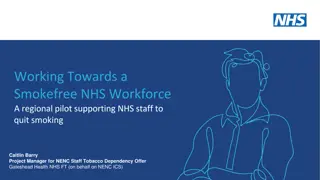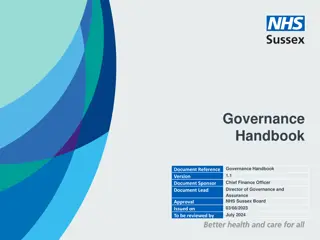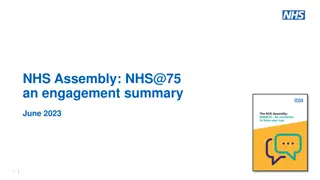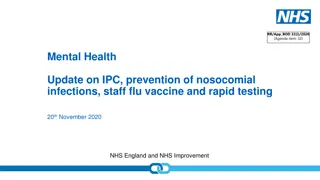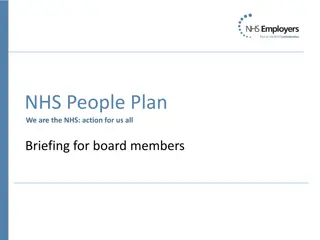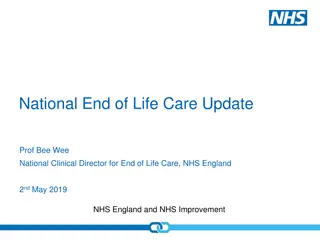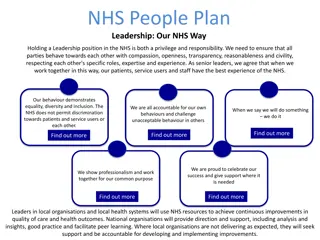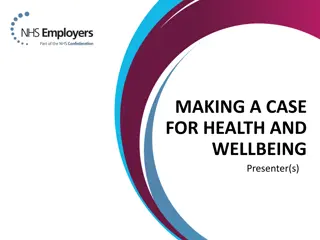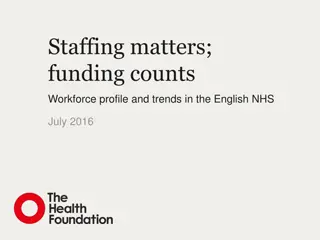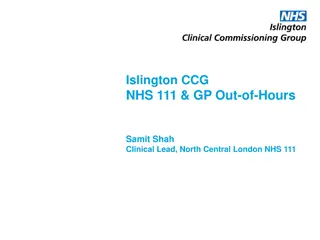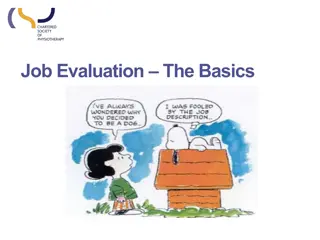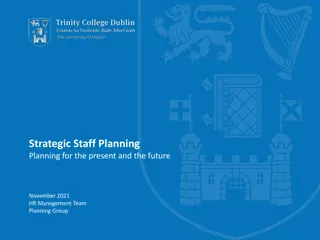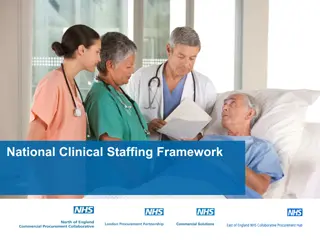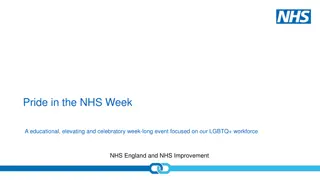Understanding the Basics of Financial Planning in the NHS
This informative content provides an overview of financial planning within the NHS, covering topics such as the 2015 NHS Pension Scheme, protecting income during illness, getting mortgage ready, and understanding schemes like the Legacy Scheme. Details on pension build-up rates, annual revaluation, and length of scheme membership are explained, alongside considerations for those leaving the NHS and moving abroad.
Download Presentation

Please find below an Image/Link to download the presentation.
The content on the website is provided AS IS for your information and personal use only. It may not be sold, licensed, or shared on other websites without obtaining consent from the author. Download presentation by click this link. If you encounter any issues during the download, it is possible that the publisher has removed the file from their server.
E N D
Presentation Transcript
Introduction to the basics of financial planning working for the NHS
Todays agenda 2015 NHS Pension Scheme Protecting your income when sick Getting mortgage ready About Chase de Vere Our service and charges Frequently asked Questions
The Legacy Scheme Final salary Final salary 1/80th Accrual Rate Retirement age 60 1/60th Accrual Rate Retirement age 65 Automatic lump sum of 3x pension Added years No automatic lump sum No added years
The 2015 NHS Pension Scheme explained
2015 NHS Pension Scheme Explained Build up rate The amount of pension you earn each year is determined by what is known as the build up rate which is usually shown as a fraction of your pensionable earnings. In this Scheme the build-up rate is 1/54th, so you earn a pension each year of 1/54th of your pensionable earnings. For example, if you earn 54,000 in a year you would earn a pension for that year of 1/54th of 54,000, which is 1,000. This is the pension you would build up for that year.
2015 NHS Pension Scheme Explained Annual revaluation Your pension earned each year will be increased each year by a rate, known as revaluation , in the period before you retire or leave. The revaluation rate is currently Consumer Prices Index (CPI) plus 1.5% each year. For example, if CPI was 2% then the pension would be revalued by 3.5% at the beginning of the following year. If you leave this Scheme before becoming entitled to claim your retirement benefits, annual revaluation stops and is replaced at retirement by the addition of Pensions Increase. Pensions Increase is used to maintain the value of your pension against rises in the cost of living.
2015 NHS Pension Scheme Explained Length of Scheme membership You can continue to build up pension rights in this Scheme until age 75 with no limit to the number of years pensionable earnings. Each year of membership adds a value to the pension. The years of membership are then added together to provide one overall pension.
What if I leave the NHS Pension Scheme and move abroad? To qualify for a refund of pension contributions you must have less than two years qualifying membership. You do not qualify for a refund of pension contributions if you have 2 or more years qualifying membership. However, you will have accumulated a pension benefit which can start to be paid at any age from the minimum pension age (currently 55*) up to age 75. This pension can be payable wherever you are resident in the world and can be paid directly into any UK authorised Bank Account. If you decide not to maintain a bank account in the UK, payments can be made direct to your own bank account, held in the country specified on the bank mandate, in local currency. *Legislation has been introduced to increase the minimum pension age to 57 from April 2028.
Annual Benefit Statements After the end of each Scheme year (31 March), an Annual Benefit Statement of the pension benefits you have earned will be available for you to view. This will be either: part of your Total Reward Statement (TRS) which will also provide you with information about your pay, annual leave and any local benefits offered by your employer; or a stand-alone statement covering pension benefits only. You can access your statement through the TRS portal at: www.totalrewardstatements.nhs.uk/ For more information about the statements, visit the TRS information website at: www.nhsbsa.nhs.uk/TRS
Opting out of the NHS Pension Scheme You can opt out of this Scheme at any time but you may be automatically re-enrolled by your employer every three years under the auto enrolment process. You can opt out by completing form SD502 which is available to download and print from the NHS Pensions website at: www.nhsbsa.nhs.uk/pensions. Before opting out of this Scheme you should carefully compare the relative cost to you and the whole package of benefits provided. It is rarely financially beneficial for a Junior Doctor to opt out of the NHS Pension Scheme If you are in NHS employment you may apply to your employer to re-join if you continue to satisfy the eligibility conditions. You may not re-join if you are absent from work for any reason.
Costs and contributions The cost of providing the NHS Pension Scheme is shared between members and employers. As a member you pay a contribution towards your pension based upon your pensionable earnings; the more you earn, the higher your contribution rate may be. Employers pay the rest. There are several rates of member contribution, which are set against nationally agreed full time pay rates and are different in each nation Pension contributions are taken from your pay before tax, so you receive tax relief on any amount you pay. This can reduce the net amount that you pay depending on your contribution rate, earnings level and personal rate of tax
NHS Pension Basics Membership is not compulsory however recommended. Members CAN opt out. Basic contribution rate is based on a percentage of pensionable income NHSPS : between 5.1% and 13.5%. (England and Wales) The current level of employer s contribution is 20.68%.* 0.08% of this is an admin fee and is used to fund the running of the England and Wales scheme
Pensionable pay and members contributions A member s contribution rate prior to October 2022 was based on their notional whole time equivalent (WTE) pensionable pay. This has changed to using actual pensionable pay from October 2022 in England and Wales and November 2022 in Northern Ireland. The rules remain unchanged in Scotland currently. In the 2015 CARE Scheme, the build-up of pension is based on actual earnings in each scheme year of a member s career, rather than being linked to their WTE final salary. Contribution rates based on actual pensionable pay will therefore mean that contributions for members that work part-time will more accurately reflect the amount of pension they are building up in the scheme. Many part-time employees will see a reduction in their pension contribution as a result of this change.
The NHS Pension is not just about the Pension itself
Additional benefits Life Insurance Dependants Benefits The NHS Pension Schemes provide lump sum and pension benefits to eligible dependants in the event of the member s death. These are payable to a spouse, registered civil partner, nominated qualifying partner or dependent child or children from the date of the member s death. As an active member of the pension scheme the benefits payable will be approximately 2 x relevant pensionable earnings.
What happens if I m sick and can t work?
NHS Sick Pay Entitlement (Not dependent on NHS Pension Membership) Officers during the first year of service one month s full pay and two months half pay during the second year of service two months full pay and two months half pay during the third year of service four months full pay and four months half pay during the fourth and fifth years of service five months full pay and five months half pay after completing five years of service six months full pay and six months half pay. For GPs, agency staff, Locum workers, any sick pay entitlement is likely to be less structured, and based on your contract. For some, such as locum GPs, this could be nil What happens after sick pay ends?
Ill Health Retirement Pension (For members of the NHS Pension Scheme) From 1 April 2008 there has been a two tier system dependent on the severity of the condition or illness, which must be of a permanent nature Tier 2 Tier 1 assessed as being unable to undertake any regular employment assessed as being unable to undertake current duties (i.e. unable to undertake current duties AND could not do any other job across a general field of employment to the same extent as they were undertaking in their own job)
Ill Health Retirement Pension Tier 1 - Pension already earned paid without reduction. Tier 2 - Tier 1 plus the tier 2 addition which is pro rata enhancement based on 1/2 of prospective pension to Normal Pension Age. (State Pension Age)
Would you qualify for an Ill Health Retirement Pension? An ill health pension is payable only if you are PERMANENTLY unable to work What is the probability of being able to prove any illness is permanent? If you do qualify which of course some do, will this be enough? Would you prefer to be in control of your own financial future, or take a chance? Now more than ever, we all appreciate, it can happen to any of us Ensure your income protection is in place and up to date to reflect your current circumstances
Income Protection Insurance Considered the most essential of all financial planning tools Guaranteed to pay out until your normal retirement age, your return to work or your death Can provide benefits on an own occupation basis Can provide the security of index linked guaranteed premiums Does any existing cover you have provide these benefits? Have you had a significant wage increase or other change in circumstances since you took out any existing cover? We will discuss appropriate levels of income protection taking into consideration your opinions and thoughts Is now the time to review and take back control?
How do I save? 2. 1. 3. Set a savings goal Start with an emergency fund Make it easy make your first savings goal a rainy day fund for sudden costs like a broken washing machine or a new gearbox. Aim to save at least 3 months essential costs. why not set up a monthly Standing Order or Direct Debit from your current account to your savings account. That way you can t forget, or spend the money on something else. anything from a season ticket for your favourite team, to a weekend away or a new car. Open a dedicated savings account and give it a name.
Thinking about buying a home?
Mortgage myths for IMGs I can t get a mortgage as I have only recently moved to the country? Reality All subject to satisfactory credit score this is the most important bit! No minimum time in UK for application 10% deposit options available The longer in the UK the more options will be Higher income gives more options Your home may be repossessed if you do not keep up repayments on your mortgage.
How Chase de Veres Mortgage Service can help Whole of Market Mortgage and Protection Advice Dedicated qualified advisers and administrators Complete understanding of the NHS pay scales and how to present to lenders Bespoke lenders and underwriting options for professional clients No mortgage advice fees paid Conveyancing and surveying options to keep everything in one place Buyer Protection Guarantee for BMA members buying a property Your home may be repossessed if you do not keep up repayments on your mortgage
Chase de Vere Medical Our service
What makes our service different? Bespoke Independent Specialist We empower doctors to make well informed financial decisions. Our expertise is truly specialised to your profession. We re not tied to any provider and so have the marketplace at our disposal to find the best solutions to suit you. Your goals and circumstances are unique to you, so is the financial advice we provide. Comprehensive Award-winning Trusted From investment planning and wealth preservation to insurance protection and providing for retirement we can help. We are often recognised for our unparalleled standards by fellow professionals and independent judges. Over 14,000 doctors have entrusted their personal finances to our advice. We are also partners to the British Medical Association.
What to expect from your complimentary meeting You will meet with one of our specialist advisers by phone, video or in-person your choice. Typically between 60 and 90 minutes. Together, we will build a picture of where you are now, where you want to be in the future, and start thinking about how best to get there. We will be clear about how we can help, and what our fees might be. It s then up to you whether you instruct us no pressure.
Questions and answers Scan here to book a complimentary meeting



